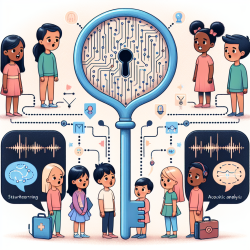Introduction
Treacher Collins Syndrome (TCS) is a rare congenital disorder affecting craniofacial development, often leading to significant speech impairments. A recent study titled "Associations between speech features and phenotypic severity in Treacher Collins syndrome" provides valuable insights into the correlation between speech characteristics and the severity of TCS. This blog explores how practitioners can leverage these findings to enhance speech therapy outcomes for children with TCS.
Understanding the Research
The study examined 19 individuals with TCS, assessing their articulation, nasal resonance, voice, and intelligibility. Participants were divided into three age groups: children (5-10 years), adolescents (11-18 years), and adults (29 years and older). The research found that children and adolescents exhibited significantly higher speech deviations compared to adults, with a notable correlation between speech impairments and the phenotypic severity of TCS.
Key Findings and Implications
- Speech Deviations: Children and adolescents with TCS displayed higher speech composite scores, indicating multiple speech deviations, particularly in articulation, nasal resonance, and voice.
- Intelligibility: The intelligibility of speech was markedly lower in children and adolescents compared to adults, affecting communication effectiveness.
- Correlation with Phenotypic Severity: The study found a significant correlation between speech composite scores and the severity of TCS, as well as orofacial dysfunction.
Practical Applications for Practitioners
Practitioners can utilize these findings to tailor their therapeutic approaches for children with TCS. Here are some strategies to consider:
- Early Intervention: Focus on early assessment and intervention for young children to address speech deviations promptly.
- Multidisciplinary Approach: Collaborate with other healthcare professionals to address the comprehensive needs of children with TCS, including orofacial dysfunction and hearing impairments.
- Customized Therapy Plans: Develop individualized therapy plans that consider the phenotypic severity and specific speech challenges of each child.
Encouraging Further Research
While this study provides valuable insights, further research is needed to explore the long-term effects of speech therapy interventions on children with TCS. Practitioners are encouraged to participate in or initiate studies that investigate the efficacy of various therapeutic approaches, particularly in relation to the phenotypic severity of TCS.
Conclusion
Understanding the associations between speech features and phenotypic severity in TCS is crucial for optimizing therapeutic outcomes. By integrating data-driven insights into practice, speech-language pathologists can significantly improve communication skills and quality of life for children with TCS.
To read the original research paper, please follow this link: Associations between speech features and phenotypic severity in Treacher Collins syndrome.










